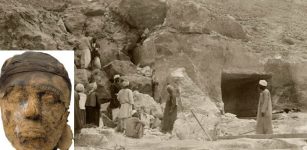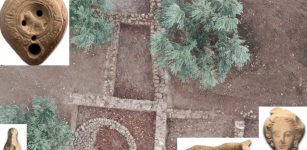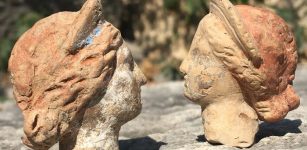Mysterious Deaths Around Empress Cixi – Cruel Tyrant Or Victim Of Propaganda?
Ellen Lloyd - AncientPages.com - Did Empress Cixi poison her enemies to stay in power? Historians find it suspicious that some people close to Empress Cixi died suddenly under mysterious circumstances.
Was it just a coincidence, or was Cixi's desire to rule so strong that she eliminated those who stood in her way?
Empress Dowager Cixi. Image cover from the book Empress Dowager Cixi: The Concubine Who Launched Modern China by Jung Chang
Empress Dowager Cixi was a remarkable woman who helped launch modern China. Some parts of her history remain obscure, but there is no doubt that she acquired enormous political influence.
She exploited her position as a royal concubine, engaging in court intrigues and manipulating those around her.
Who Was Empress Dowager Cixi?
Empress Dowager Cixi (1835-1908), whose name was Yehenara from the beginning, came from a minor but prestigious Manchu family. She was intelligent, and her parents gave her a proper education. She could read, write, draw and sew. At an early age, she showed interest in the economy and often gave her father advice on business-related questions.
Yehenara was no extraordinary beauty but a pretty and intelligent girl.
Something about her made a strong impression on the 21-year-old Emperor Xianfeng because he picked her to join his harem. Today it may sound like a nightmare, but living as an Emperor's concubine was many Chinese girls' dream in those days. Life in a harem was desirable by many women.
Emperor Xianfeng. Credit: Public Domain
Yehenara moved to the Emperor's harem, where she was given the name Cixi which means "friendly and happy."
Cixi would likely remain just one of many concubines, but fate had other plans for her.
Her determined attitude and the fact that she gave birth to Emperor Xianfeng's only surviving son resulted in her rise to the top of the concubine ranks.
She became close friends with Emperor Xianfeng's highest-ranking concubine and wife, Empress Cian.
Cixi Becomes Regent Ruler
When Emperor Xianfeng died in 1861, she became Empress Dowage, and her five-year-old son became the Tongzhi Emperor.
Interestingly shortly before Emperor Xianfeng died, he appointed a group of regents to assume the regency. It did not appeal to Cixi, and together with Empress Cian and the late Emperor's brothers, she staged a coup against the regents who were convicted as traitors.
Empress Cixi was now in control with the regents gone, and she became a regent ruler. Cixi relinquished the regency when her son turned 17, but Tongzhi died two years later, and Cixi became a regent again, this time for her three-year-old nephew Guangxu.
Mysterious Death Of Concubine Alute And Her Unborn Child
Famous for his wild parties, drinking, and use of opium, it soon became apparent that Empress Cixi's son was not a suitable Emperor. What also made Cixi furious was that her son married the granddaughter of one of her political adversaries.
One of the concubines was pregnant, but she was eliminated. Credit: Qiu Ying - Public Domain
Her son Tongzhi didn't have an heir who could claim the throne, but his first-ranking concubine, Alute, was pregnant. Empress Cixi did her best to protect her son from his wife and provided him with many concubines. Then, Tongzhi suddenly died when he was only 19-year.old.
During the debate over succession, Alute and her unborn child suddenly died. The court announced it as a suicide, but some were suspicious.
Had the young woman and her unborn child been murdered by Empress Cixi or one of the late Emperor's five brothers, princes of the imperial court, who had their rivalries and ambitions for controlling the throne indirectly?
Emperor Guangxu's Mother Dies Suddenly
Empress Cixi quickly took control of the dynasty and installed her nephew as the Guangxu Emperor. In a concise time, Guangxu's mother died under mysterious circumstances, and Cixi became Emperor Guangxu's closest relative.
It was very convenient because Empress Cixi could stay in power for many years.
Empress Cixi was very conservative and disliked modern Western inventions, but her nephew Emperor Guangxu was of a different opinion and announced a program of modernizing reforms.
As soon as Guangxu Emperor became 17-year-old, he sent Cixi away from the court.
In 1898, Emperor Guangxu launched the Hundred Days Reform, a well-intentioned but poorly implemented attempt to modernize many aspects of Chinese society that nearly caused a civil war.
Empress Cixi regained the regency with support from conservatives who opposed the reforms. She ruled China for almost 50 years, and her forceful personality kept the imperial system in existence. It was overthrown three years after her death in 1911, and China became a republic.
Emperor Guangxu Dies From Arsenic Poisoning
Historians both in China and abroad have long portrayed her as a despot responsible for the fall of the Qing dynasty.
Readers of Ancient Pages may recall the story of Dragon Empress Wu Zetian, who challenged Confucian beliefs against female rulers. Dragon Empress Wu Zetian is often presented as a ruthless, conniving, scheming, and bloodthirsty woman who even murdered her daughter to gain power. The story of both these women is similar, but it seems Empress Cixi had more on her conscience.
Was Empress Cixi a victim of propaganda? Many historians paint her as a wicked, cruel, and greedy tyrant of the east whose enemies often mysteriously dropped dead. Some admire her and say she was China's last and most famous Empress.
Still, we should not forget that her death came only a day after the death of the Guangxu Emperor.
On 4 November 2008, forensic tests concluded that Emperor Guangxu died from acute arsenic poisoning. The level of arsenic in his remains was 2,000 times higher than that of ordinary people" Many modern historians are convinced that Cixi murdered the Guangxu Emperor to prevent him from continuing his reforms after her death.
Updated on November 13, 2022
Written by - Ellen Lloyd – AncientPages.com
Copyright © AncientPages.com All rights reserved. This material may not be published, broadcast, rewritten or redistributed in whole or part without the express written permission of AncientPages.com
Expand for referencesMore From Ancient Pages
-
 Very Rare Ancient Roman Horse Brooch Discovered In UK
Archaeology | Mar 7, 2020
Very Rare Ancient Roman Horse Brooch Discovered In UK
Archaeology | Mar 7, 2020 -
 Heyoka – Sacred Clown Who By Doing The Opposite Helps And Guides In Daily Life
Native American Mythology | Feb 7, 2019
Heyoka – Sacred Clown Who By Doing The Opposite Helps And Guides In Daily Life
Native American Mythology | Feb 7, 2019 -
 Mystery Of Egyptian Tomb 10A And The Mummy’s Head – A 4,000-Year-Old Crime
Featured Stories | Apr 27, 2022
Mystery Of Egyptian Tomb 10A And The Mummy’s Head – A 4,000-Year-Old Crime
Featured Stories | Apr 27, 2022 -
 Earliest Evidence Of Flip Flops In The Middle Stone Age
Archaeology | Oct 27, 2023
Earliest Evidence Of Flip Flops In The Middle Stone Age
Archaeology | Oct 27, 2023 -
 Ancient City Of Tenea Built By Trojan Prisoners Reveals More Archaeological Secrets
Archaeology | Feb 15, 2023
Ancient City Of Tenea Built By Trojan Prisoners Reveals More Archaeological Secrets
Archaeology | Feb 15, 2023 -
 Surprising Discovery Of Box Filled With Neanderthal Bones From Cova Simanya Donated To Museum
Archaeology | Sep 21, 2023
Surprising Discovery Of Box Filled With Neanderthal Bones From Cova Simanya Donated To Museum
Archaeology | Sep 21, 2023 -
 Iraq’s Ancient Kish City Survived The Great Flood – Today It’s Neglected And Lies Buried In Sand
Civilizations | Sep 24, 2015
Iraq’s Ancient Kish City Survived The Great Flood – Today It’s Neglected And Lies Buried In Sand
Civilizations | Sep 24, 2015 -
 Lost Ancient Extraterrestrial Knowledge And The Ignorance Of Modern Man
Ancient Mysteries | Jul 30, 2020
Lost Ancient Extraterrestrial Knowledge And The Ignorance Of Modern Man
Ancient Mysteries | Jul 30, 2020 -
 Beautiful Terracotta Figurine Collection Discovered In Myra, Antalya
Archaeology | Sep 29, 2020
Beautiful Terracotta Figurine Collection Discovered In Myra, Antalya
Archaeology | Sep 29, 2020 -
 Axis Mundi That Symbolizes Separation Of The Earth From The Heaven
Featured Stories | Jul 2, 2018
Axis Mundi That Symbolizes Separation Of The Earth From The Heaven
Featured Stories | Jul 2, 2018 -
 Ancient Roman Laws Give Us A Window Into A World Of Abuse
Featured Stories | May 24, 2022
Ancient Roman Laws Give Us A Window Into A World Of Abuse
Featured Stories | May 24, 2022 -
 New Fossil Link In Bird Evolution Discovered
Evolution | Sep 7, 2023
New Fossil Link In Bird Evolution Discovered
Evolution | Sep 7, 2023 -
 We Need To Look Underwater To Understand Our Past – New Study
Archaeology | Apr 14, 2023
We Need To Look Underwater To Understand Our Past – New Study
Archaeology | Apr 14, 2023 -
 Mythical Fiery Bird Phoenix In Mythologies Of Many Ancient Cultures
Featured Stories | Mar 23, 2017
Mythical Fiery Bird Phoenix In Mythologies Of Many Ancient Cultures
Featured Stories | Mar 23, 2017 -
 Count Dracula: His Letters Helped Researchers Cast New Light On Health Of Legendary Figure
Historical Figures | Aug 17, 2023
Count Dracula: His Letters Helped Researchers Cast New Light On Health Of Legendary Figure
Historical Figures | Aug 17, 2023 -
 Medieval Paradise Cockaigne – Land Of Extreme Pleasure And Luxury
Featured Stories | Dec 12, 2018
Medieval Paradise Cockaigne – Land Of Extreme Pleasure And Luxury
Featured Stories | Dec 12, 2018 -
 Unusual Iron Age Burial With Warrior And Sword Discovered On Gotland, Sweden – Was He From The Roman Empire?
Archaeology | Sep 7, 2021
Unusual Iron Age Burial With Warrior And Sword Discovered On Gotland, Sweden – Was He From The Roman Empire?
Archaeology | Sep 7, 2021 -
 Unique 1,300-Year-Old Pala Period Idol Of Snake Goddess, Nag Devi Discovered Near Nalanda University, India
Archaeology | Apr 5, 2022
Unique 1,300-Year-Old Pala Period Idol Of Snake Goddess, Nag Devi Discovered Near Nalanda University, India
Archaeology | Apr 5, 2022 -
 Ancient Greco-Roman Amphora Workshop Discovered In Alexandria, Egypt
Archaeology | Apr 17, 2022
Ancient Greco-Roman Amphora Workshop Discovered In Alexandria, Egypt
Archaeology | Apr 17, 2022 -
 2,000-Year-Old Instruments Used By Roman Surgeons Revealed By Archaeological Scanners
Archaeology | Jul 17, 2024
2,000-Year-Old Instruments Used By Roman Surgeons Revealed By Archaeological Scanners
Archaeology | Jul 17, 2024



